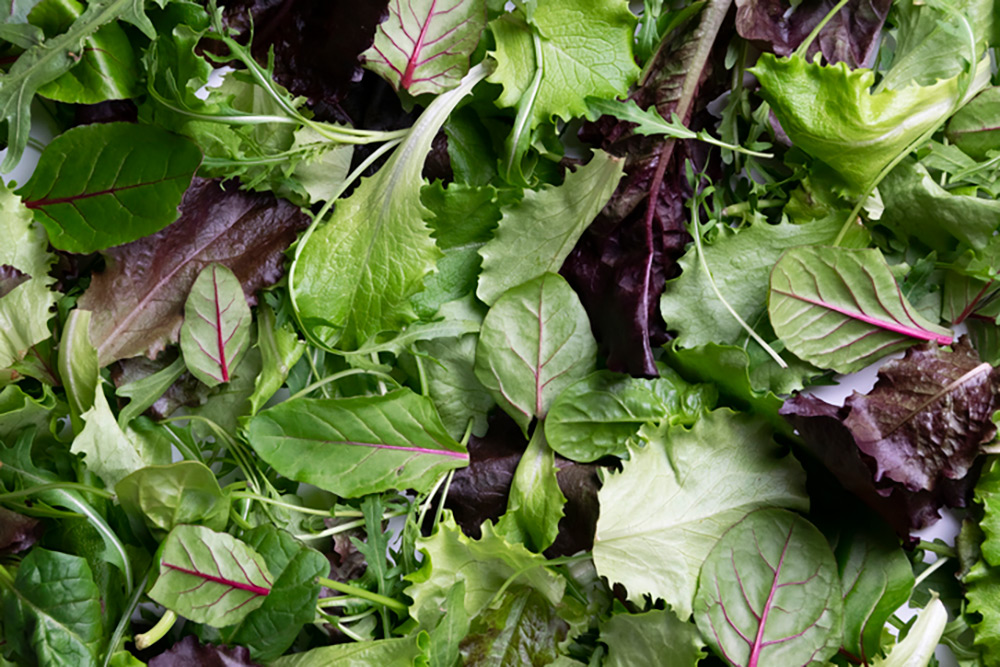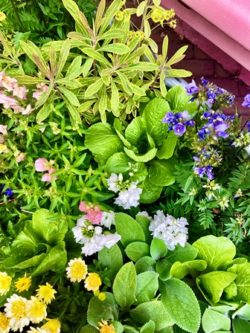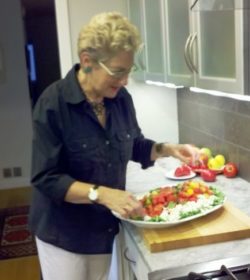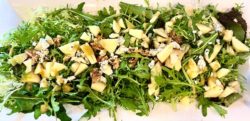By Nancy Pollard
After owning one of the best cooking stores in the US for 47 years—La Cuisine: The Cook’s Resource in Alexandria, Virginia—Nancy Pollard writes Kitchen Detail, a blog about food in all its aspects—recipes, film, books, travel, superior sources, and food-related issues.
 GONE ARE the days when the topic of salad was relegated to the Ladies Who Lunch Division. My first memory of salad (other than learning I despised iceberg lettuce) was having to memorize Cleopatra’s speech from Shakespeare’s Julius Caesar in junior high school:
GONE ARE the days when the topic of salad was relegated to the Ladies Who Lunch Division. My first memory of salad (other than learning I despised iceberg lettuce) was having to memorize Cleopatra’s speech from Shakespeare’s Julius Caesar in junior high school:
My salad days, when I was green in judgment, cold in blood . . . Ah, to be in love in your salad days—such blissful and carefree times!
Later, I served salad to accompany a selection of cheeses, which I like to have to accompany the final sips of my usually red wine. This bothered the RWM (Resident Wine Maniac), who felt quite strongly that lettuce leaves and fermented grapes did not marry well. It may have started out as part of my love affair with French cuisine, but actually I loved having salad (and cheese) with red wine. The Ladies Who Lunch salads just didn’t work in that role. They were often large piles of arugula and other assorted greens (usually from a California grower not so near you) decked with salmon or chicken or lots of seeds and non-animal protein. Dressings were usually on the side, which meant it was difficult to really toss your greens on an undersized plate.
Salads With Style
Fast-forward to the last decade or so, when salads were reexamined by chefs and cookbook authors. My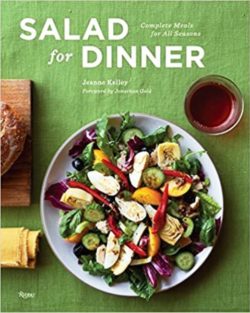 favorite salad book was Salad for Dinner by Jeanne Kelley, who is a Los Angeles-based food writer and food stylist. My daughter in the UK told me how helpful it was to make a salad into a meal with her book—you probably have the makings for any number of her recipes in your fridge, unless you live on take-out. Its author helped me to create meals at home that were salads but with interesting dressings and hearty protein combinations that were really appreciated by another person in this house who usually pushed greens around on the plate, hoping that it would appear as if he had eaten most of the them. Plus, I loved that she had only one dessert at the end of the book—a rich chocolate pie—because, obviously, if you have salad for dinner, there is plenty of room for a dessert.
favorite salad book was Salad for Dinner by Jeanne Kelley, who is a Los Angeles-based food writer and food stylist. My daughter in the UK told me how helpful it was to make a salad into a meal with her book—you probably have the makings for any number of her recipes in your fridge, unless you live on take-out. Its author helped me to create meals at home that were salads but with interesting dressings and hearty protein combinations that were really appreciated by another person in this house who usually pushed greens around on the plate, hoping that it would appear as if he had eaten most of the them. Plus, I loved that she had only one dessert at the end of the book—a rich chocolate pie—because, obviously, if you have salad for dinner, there is plenty of room for a dessert.
More recently, a journalist and author of The Comfort Food Diaries founded a blog on Substack that offers a free subscriber version and a more enriched version to paying subscribers. Emily Rees Nunn combines an acerbic wit and political commentary along with her salad digressions in The Department of Salad. And for the last few years, I have started to grow salad greens in my window boxes and horse troughs, right among the flowers, something I learned from Jody McGowan, an extraordinary professional gardener who helped turn my black thumb green.
The Goddess of Salad
That said, I have a friend who my husband refers to as the Salad Goddess. Michaele Weissman is a writer’s writer. She is also a terrific cook and serves salads as a first course, almost always. Rather than in a large bowl, she serves them in a large rectangular or oval platter, and you can have as much or as little as you desire. And unlike at home, my husband always has second helpings. Michaele is very picky about her ingredients and always manages to find a great feta cheese or lovely walnuts, and of course she has made a greens grower at her local farmers market one of her besties. But the real test for a Salad Goddess is to make divine salads in winter, and she waves her tongs and does that too. Even as we emerge from that weather now, I feel I owe it to KD readers to divulge some of her techniques.
A Salad for the JanFebs
To create an attractive large salad platter for the cold months, you start by creating a base with a small head of radicchio, broken up, and six to eight small endives, sliced in half, core removed and then sliced horizontally into bite-sized pieces. To this you will add a couple of handfuls of the best small salad greens you can find in this bare time of year. Of the packaged brands, she prefers the selections under the Organic Girl label. She feels that they are fresher than many others, but of course always checks the sell-by dates. Michaele pointed out that you do want the bitter green taste of the radicchio and endive to dominate.
Sometimes she roasts three or four golden beets in foil at 375F for about 45 minutes— they should still be firm. She uses only golden ones for salads as their taste is sweeter and less earthy than that of the red ones. These are peeled and diced or sliced thinly and scattered along the top of the greens. One or two Cara Cara oranges are cut into suprêmes without the membrane and added to the the layout. Michaele advises to save the juice extruded from this process, then add it to the base winter vinaigrette. To this, a half cup or more of pomegrante seeds are added. For the cheese component, she suggest three or four ounces of the best-quality Roquefort. When Roquefort is cold, it breaks easily into small pieces. She told me that inexpensive blue cheeses taste soapy to her. As with the greens, quality really matters. If pomegranates are not available to you, chop some roasted almonds or walnuts (again, look for the best quality) and toss those in for added crunch.
Winter Vinaigrette
6 to 8 servings
This is Michaele Weissman’s Winter Vinaigrette for a salad with fruits such as oranges, pomegranates, dates, and other sweet fruits you can find at the grocery store—but obviously not canned. The dressing below is dressing for enough salad to feed 6 to 8.
1 scant tablespoon finely chopped shallots
1 scant tablespoon Dijon mustard
1 scant tablespoon honey
Freshly ground pepper (¼ teaspoon or more)
½ teaspoon of orange zest from orange peel (optional)
¼ teaspoon salt (Dijon mustard has salt, so less is more)
½ cup extra-virgin olive oil
Approximately 3 tablespoons of any of the following: You need to taste your choices of vinegars. Her preferences are red wine vinegar, sherry wine vinegar, and occasionally apple cider vinegar. Her latest favorite acid notes are champagne or white balsamic vinegar and even a flavorful orange juice.
Then all you do is whisk thoroughly. The mixture must be emulsified, almost creamy. Taste to adjust seasoning. You want a smooth blend of flavors, no overly acidic note kicking you in the back of your throat. Dressing is very lightly drizzled onto the salad right before serving.
A Spring and Summer Dressing
6 to 8 servings
Following her basic layout, you can create any number of platter salads with treasures you’ll find in your farmers markets. Her basic vinaigrette for a spring to early fall salad will also be enough for 6 to 8 portions.
We all know that it is easy to create a gorgeous salad with local produce in the spring and summer. I don’t have Michaele’s knack for combining the right fruits with summer vegetables, but she has emboldened me to try different pairings. This summer I plan to smell and taste different fruits and vegetables for salad pairings and catalogue my successes.
1 scant tablespoon finely chopped shallots
¼ teaspoon finely chopped garlic (if you like)
1 scant tablespoon Dijon mustard
Freshly ground pepper (¼ teaspoon or more)
2 or 3 tablespoons of finely chopped Italian parsley (optional)
¼ teaspoon salt (Dijon mustard has salt, so less is more)
½ cup virgin olive oil
1 tablespoon red wine vinegar (Spanish sherry vinegar is particularly delicious)
1 tablespoon champagne vinegar or white balsamic vinegar
1 teaspoon lemon juice
Again, you whisk it together until thoroughly emulsified and taste to make adjustments. Just before serving, lightly drizzle the dressing over the arranged salad. It takes a little practice to know the right amount. When the salad is laid out like this, it is not necessary to try and mix in the dressing.
Now, relax, serve yourself some salad and a glass of wine!
This post first appeared on the Kitchen Detail blog.
.
MyLittleBird often includes links to products we write about. Our editorial choices are made independently; nonetheless, a purchase made through such a link can sometimes result in MyLittleBird receiving a commission on the sale. We are also an Amazon Associate.

